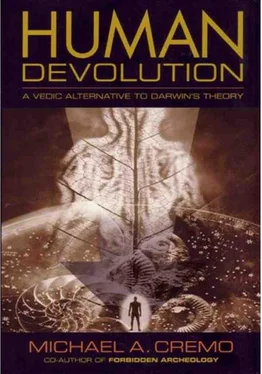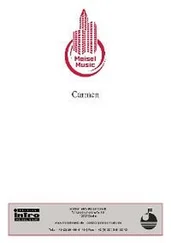Michael Cremo - Human Devolution - A Vedic Alternative To Darwin's Theory
Здесь есть возможность читать онлайн «Michael Cremo - Human Devolution - A Vedic Alternative To Darwin's Theory» весь текст электронной книги совершенно бесплатно (целиком полную версию без сокращений). В некоторых случаях можно слушать аудио, скачать через торрент в формате fb2 и присутствует краткое содержание. Год выпуска: 2003, ISBN: 2003, Издательство: Torchlight Publishing, Жанр: Старинная литература, на английском языке. Описание произведения, (предисловие) а так же отзывы посетителей доступны на портале библиотеки ЛибКат.
- Название:Human Devolution: A Vedic Alternative To Darwin's Theory
- Автор:
- Издательство:Torchlight Publishing
- Жанр:
- Год:2003
- ISBN:9780892133345
- Рейтинг книги:4 / 5. Голосов: 1
-
Избранное:Добавить в избранное
- Отзывы:
-
Ваша оценка:
- 80
- 1
- 2
- 3
- 4
- 5
Human Devolution: A Vedic Alternative To Darwin's Theory: краткое содержание, описание и аннотация
Предлагаем к чтению аннотацию, описание, краткое содержание или предисловие (зависит от того, что написал сам автор книги «Human Devolution: A Vedic Alternative To Darwin's Theory»). Если вы не нашли необходимую информацию о книге — напишите в комментариях, мы постараемся отыскать её.
Human Devolution: A Vedic Alternative To Darwin's Theory — читать онлайн бесплатно полную книгу (весь текст) целиком
Ниже представлен текст книги, разбитый по страницам. Система сохранения места последней прочитанной страницы, позволяет с удобством читать онлайн бесплатно книгу «Human Devolution: A Vedic Alternative To Darwin's Theory», без необходимости каждый раз заново искать на чём Вы остановились. Поставьте закладку, и сможете в любой момент перейти на страницу, на которой закончили чтение.
Интервал:
Закладка:
A Zulu woman described Nomkhubulwana, the daughter of Umvelinqangi, as a heavenly princess (Berglund 1976, p. 70): “She loves human beings. So she opens the heaven, allowing them to see things in there. That is when the rainbow is seen. It is when she . . . lets them see it. The arches are the colours. They are beautiful having all the colours.” When the people see the rainbow, they say, “The Princess surely loves us. Now the rain will stop and give us sunshine. Then after a time she will bring rain again.”
In the early days, the first humans saw her directly. Now she is rarely seen. If she meets a man, she hides and asks him to turn his back and not look at her because she is naked. If one looks at her, one will become sick and die very soon. But she will sometimes speak, and her messages have great importance. She may tell a man in his garden, “This year you shall have food; although for a long time there has been famine, it shall be so no longer” (Callaway 1870, p. 254). She also gives various instructions, which the Zulu do not hesitate to follow. She is apparently sometimes seen by women. Krige (1968, p. 180) says, “A woman who claims to have met her this spring (1966) described her as a tall human figure in the mist near a thicket almost completely covered by a cape, greyish black in colour like the rain clouds.” She is also seen partially dressed with vegetable plants, reflecting her powers over agriculture.
The various forces of nature are also seen as manifestations of living entities. A Zulu man’s home was struck by lightning, and afterwards he claimed to have seen a lightning creature. He said (Berglund 1976, p.
39), “We were all in the house when suddenly the door was flung open and lightning came in, taking this one and that one. . . . Looking, I saw the thing. It was fearful to see and moved very quickly. But I saw it clearly. It was a bird. The feathers were white, burning. The beak and legs were red with fire, and the tail was something else, like burning green or like the colour of the sky. It ran quickly, saying nothing, simply snatching those whom it took. Then it touched the grass with its fire. It vanished through the door again.”
Concerning the origin of humans, Raum (1973, p. 76) says: “The Zulu do not consider that mankind originated by sexual reproduction but by a process resembling vegetative reproduction. There occurred a hiving-off, a division from a pre-existing entity. This entity is either called uhlanga (reed-bed) or umhlaba (earth). The agent responsible for the splitting off is Unkulunkulu.” Because humans are said to have come from a reed, reeds are held sacred and can only be cut by permission of a Zulu chief (Raum 1973, p. 76). Unkulunkulu is not directly part of any particular Zulu tribal lineage, but is the origin of all of them (Raum 1973, p. 76). It appears that there were sub-Unkulunkulus who were the creators of the members of specific tribes and races in addition to the “Unkulunkulu of all men” (Callaway 1870, p. 96).
Among the Zulu are female “diviners,” who give medicines and perform cures. They are called isangoma. In her book Body and mind in Zulu medicine, Harriet Ngubane (1977, p. 102) says: “A person does not choose to become a diviner ( isangoma ), but is said to be chosen by her ancestors, who bestow upon her clairvoyant powers. A neophyte learns about medicine from a qualified diviner to whom she is apprenticed for some time, but in addition some medicines are said to be revealed to her by her ancestors. I have already mentioned that the ancestral spirits do not take possession of the body, but they are close to the diviner—they
‘sit’ on her shoulders and whisper into her ears.”
The Zulus also have various categories of “doctors.” Some cure diseases with the aid of spirits. Another kind of doctor, the heaven doctor, operates on the weather and other natural forces, relying on his own knowledge of magic. Such doctors are often called heaven herds, because they herd storm clouds, with their dangerous lightning and hail, just like boys herd cattle. Eileen Jensen Krige (1968, p. 310) says, “They run out with their weapons and rain-shields and shout to the lightning, telling it to depart and go elsewhere, and whistling as cattle-herds do. No matter how old a heaven-doctor may be, he is always called ‘a young man who herds.’”
Part of the lore of sorcery and magic are “familiars,” spirits, often embodied in animals, who serve witches or wizards. The most important familiar among the Zulus is the wild cat called impaka. It can take control of dogs, cattle, snakes and other animals, inducing them to cause trouble to targeted people. Krige says (1968, p. 325), “To expel the animal and discover the wizard, a diviner will immediately be employed.”
The Zulu concept of the life-soul is connected with a person’s reflection. The Zulus hesitate to look at their reflection in a dark pool of water, fearing that a beast hidden in the pool will take it, thus depriving them of life (Raum 1973, p. 123). A pregnant woman believes she gives life to her child through her reflection. By custom, she therefore keeps a water pot in which only she can look. If someone else looks, the stranger may take away the child’s life. The reflecting surfaces of lakes and rivers are considered gateways to other worlds. One who loses one’s life in the water may find a new life on the other side of the surface (Raum 1973, p.123). The Zulu also believe that the life-soul (called iklozi or ithongo ) is connected with a person’s shadow ( ithunzi ).After death the shadow passes some time in the bush or veld. The name for the dead is abaphansi, the people below.The departed ancestors depend on the prayers and sacrifices offered by their descendants, who in turn depend on the intercession of their ancestors. Raum (1973, p. 76) says that the ancestors “have control over the good and bad fortune of their descendants.”
Cosmology of the igbo of West africa
The Igbo people of West Africa live mostly in the present day country of Nigeria. According to the Igbo, each human being has a spirit double called the chi. Anthropologist Charles Kingsley Meek (1970, p. 55) states that the chi is a “transcendent self” and “closely resembles the Egyptian conception of the ka, which was the double or genius of a man, an ancestral emanation, apparently, which guided and protected him during his lifetime and to which he returned after death.” Conceptions of the chi vary somewhat, but Okpewho (1998, pp. 90–91) says: “It is at least generally recognized that chi is the spirit which helps the protoself negotiate a prenatal destiny before the supreme divinity; it either remains in the spiritual world to ensure the individual’s welfare as (s)he acts out his/ her choice or accompanies him/her to the world as some kind of protective spirit-double.”
The connection between person and chi is established at the time of conception. The Igbo, who believe in reincarnation, say that the chi in one life is different from that in the next. This might result in a person being rich in one lifetime and poor in another. Further describing the chi, Meek (1970, p. 55) says, “A man’s abilities, faults, and good or bad fortune are ascribed to his chi, and this explains, to some extent, the fatalistic attitude of the Ibo. If a man’s conduct gets him into trouble he excuses himself by saying (and believing) that his chi and not himself is responsible.” Animals also have their chi. When an Igbo hunter finds his arrow misses its animal target, he attributes this to the protective action of the animal’s chi . Meek (1970, p. 55) adds: “An animal may become the chi of a man, and people who behave in a brutal manner are believed to have the chi of an animal. It is said that the children of hunters are liable to have the chi of animals slain by their fathers. In this way animals revenge themselves on men.”
Читать дальшеИнтервал:
Закладка:
Похожие книги на «Human Devolution: A Vedic Alternative To Darwin's Theory»
Представляем Вашему вниманию похожие книги на «Human Devolution: A Vedic Alternative To Darwin's Theory» списком для выбора. Мы отобрали схожую по названию и смыслу литературу в надежде предоставить читателям больше вариантов отыскать новые, интересные, ещё непрочитанные произведения.
Обсуждение, отзывы о книге «Human Devolution: A Vedic Alternative To Darwin's Theory» и просто собственные мнения читателей. Оставьте ваши комментарии, напишите, что Вы думаете о произведении, его смысле или главных героях. Укажите что конкретно понравилось, а что нет, и почему Вы так считаете.












